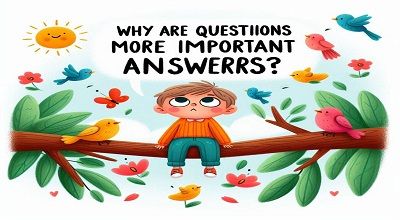Questions More Important Than Answers
The idea that questions more important than answers is a perspective often associated with fostering curiosity, critical thinking, and continuous learning. Here are several reasons why questions can be considered more important than answers:
- Stimulate Critical Thinking: Questions encourage individuals to think critically and analyze information. By posing questions, people are prompted to consider different perspectives, evaluate evidence, and engage in deeper thought processes.
- Ignite Curiosity: Questions spark curiosity and drive the quest for knowledge. They create a sense of wonder and inspire individuals to seek out information, explore new ideas, and expand their understanding of the world.
- Encourage Exploration: Questions lead to exploration and experimentation. When faced with a question, individuals are motivated to explore various avenues, experiment with solutions, and learn from the process, even if the answer is not immediately apparent.
- Promote Lifelong Learning: Answers provide information, but questions promote a continuous desire to learn. By focusing on questions, individuals develop a mindset of lifelong learning, always seeking to understand more and improve their knowledge and skills.
- Facilitate Problem-Solving: Questions are instrumental in problem-solving. They help identify the root cause of an issue, clarify objectives, and guide the development of effective solutions. In contrast, answers alone may not address the underlying problems.
Read more…
- Adaptability and Innovation: In a rapidly changing world, questions foster adaptability and innovation. Constantly questioning the status quo can lead to the development of new ideas, technologies, and approaches that drive progress.
- Promote Communication and Collaboration: Asking questions promotes communication and collaboration. It encourages open dialogue, the exchange of ideas, and the development of shared understanding. Questions can bridge gaps in knowledge and facilitate collaboration among individuals with different perspectives.
- Deepen Understanding: Questions deepen understanding by prompting individuals to delve into the nuances and complexities of a topic. Through the process of questioning, one can gain a more profound comprehension of subjects.
- Empowerment: The ability to ask meaningful questions empowers individuals to take an active role in their own learning and decision-making processes. It gives them the tools to seek information, make informed choices, and contribute meaningfully to discussions.
- Prevent Stagnation: Relying solely on answers can lead to complacency and stagnation. Questions challenge the status quo, driving progress and preventing individuals and societies from becoming entrenched in outdated beliefs or practices.
Final Words
While answers provide specific information, questions are the catalysts for intellectual growth, exploration, and discovery. Embracing a questioning mindset can lead to a more dynamic and adaptable approach to learning and problem-solving.
